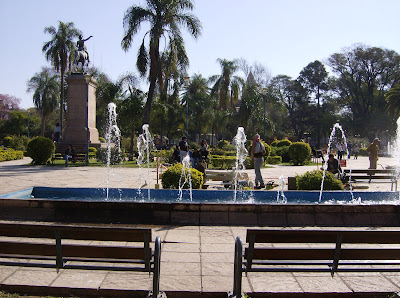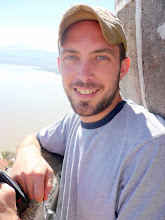
Well, there will be no snow angels this Christmas, as I sit here in 90 degree weather with the fan on. We are having Christmas pageants at both churches, and the picture is of the Christmas pageant at San Mateo. If you look closely, you can see Joseph sweating.
I was talking to some of the women at Misión Maria Magdalena about Christmas here, and they were laughing about the fact that it is so hot during Christmas, but yet they eat a hot Christmas ham. They told me that for those who can afford it, they put presents under the tree. They said one thing that has changed, especially in their neighborhood, is that people used to gather the whole extended family, but now they stay home, because if they leave their house unattended, they have a high risk of getting robbed. Fireworks are big during the Christmas season. I recently told a four year old boy why throwing fireworks at horses was a bad idea.
We have been lighting the Advent candles on the corona (Advent wreath), and we’ve now started practicing for the Christmas pagent. Getting Maria and Jose (Mary and Joseph) to talk to each other is a struggle here too. I can only imagine how much the shepherds will be sweating in the 100 degree weather. Often they have a gallo (rooster) worship service at midnight on Nochebuena (Christmas Eve). Christmas lights, trees and Santa Clause can be seen all over.
I’ve been keeping busy. I have been preaching every other week and teaching First Communion with a couple church members at Misión Maria Magdalena in Resistencia. I’ve been leading an Advent devotional series at San Mateo in Corrientes. Kids are getting out of school now, and they run up to me to show me their report cards. They have summer vacation until March, so things will calm down for a while. We will have a couple youth camps d uring the summer. This past week James has been leading the painting of a mural with the kids (see picture), which I’ve been helping with. The design theme was “My neighborhood from my perspective,” and the design is a compilation of all the kid’s drawings. The kids get excited about painting, and have taken pride in it.
uring the summer. This past week James has been leading the painting of a mural with the kids (see picture), which I’ve been helping with. The design theme was “My neighborhood from my perspective,” and the design is a compilation of all the kid’s drawings. The kids get excited about painting, and have taken pride in it.
I was talking to some of the women at Misión Maria Magdalena about Christmas here, and they were laughing about the fact that it is so hot during Christmas, but yet they eat a hot Christmas ham. They told me that for those who can afford it, they put presents under the tree. They said one thing that has changed, especially in their neighborhood, is that people used to gather the whole extended family, but now they stay home, because if they leave their house unattended, they have a high risk of getting robbed. Fireworks are big during the Christmas season. I recently told a four year old boy why throwing fireworks at horses was a bad idea.
We have been lighting the Advent candles on the corona (Advent wreath), and we’ve now started practicing for the Christmas pagent. Getting Maria and Jose (Mary and Joseph) to talk to each other is a struggle here too. I can only imagine how much the shepherds will be sweating in the 100 degree weather. Often they have a gallo (rooster) worship service at midnight on Nochebuena (Christmas Eve). Christmas lights, trees and Santa Clause can be seen all over.
I’ve been keeping busy. I have been preaching every other week and teaching First Communion with a couple church members at Misión Maria Magdalena in Resistencia. I’ve been leading an Advent devotional series at San Mateo in Corrientes. Kids are getting out of school now, and they run up to me to show me their report cards. They have summer vacation until March, so things will calm down for a while. We will have a couple youth camps d
 uring the summer. This past week James has been leading the painting of a mural with the kids (see picture), which I’ve been helping with. The design theme was “My neighborhood from my perspective,” and the design is a compilation of all the kid’s drawings. The kids get excited about painting, and have taken pride in it.
uring the summer. This past week James has been leading the painting of a mural with the kids (see picture), which I’ve been helping with. The design theme was “My neighborhood from my perspective,” and the design is a compilation of all the kid’s drawings. The kids get excited about painting, and have taken pride in it. Every week at Misión Maria Magdalena, we have church meetings. One of the issues that came up in our recent church meetings was security. In the back of the church property there is a large metal dome, which some people started to take down some of the metal plates. This brought up the general concern of security in the barrio (neighborhood), and each of the women (all the church members present at the meeting were women) expressed how unsafe they feel. Their homes had all been robbed at some point. They said part of the problem is the corruption of the police, because some of the same youth that cause problems in the barrio go on to be police. If something is stolen from you, your neighbors will likely be selling it and buying it the next day, and the police won’t address this. I’ve also heard stories of police beating youth in the barrio just for kicks, and because the youth are poor. The discussion also brought up the memories of murders that have happened within blocks of the church grounds. Random acts of vandalism are pretty common. One of the more unique ones was the piles of horse manure kids put in the middle of the cement court where the kids play soccer. One day I got a bunch of the kids to go up on the roof with me to take down all the rocks that had been thrown up there (some of whom likely threw them up there in the first place).
In one of my forms I have to fill out for the Seminary, it asked the question: What does it mean to be the Church in this community? To be church here at MMM doesn’t just mean getting fed spiritually, but amidst the uncertainty of where the next meal is coming from, children can have two certain meals every day and monthly food bags. Church is both spiritually and literally the “pan de cada día (daily bread).” In the midst of vandalism and crime, they come to church to plant trees and paint murals and renew the respect and hope they have for themselves and their community. Church here is a place where hymns of praise are sung amidst the sound of kids throwing rocks on the roof. It is a place where in the midst of poverty and injustice; people come to be filled with the grace they need to make it through the week. Not only can they be filled with a sense of their God-given dignity, but by the knowledge of their rights, and resources for and ways to exercise them.
In one of my forms I have to fill out for the Seminary, it asked the question: What does it mean to be the Church in this community? To be church here at MMM doesn’t just mean getting fed spiritually, but amidst the uncertainty of where the next meal is coming from, children can have two certain meals every day and monthly food bags. Church is both spiritually and literally the “pan de cada día (daily bread).” In the midst of vandalism and crime, they come to church to plant trees and paint murals and renew the respect and hope they have for themselves and their community. Church here is a place where hymns of praise are sung amidst the sound of kids throwing rocks on the roof. It is a place where in the midst of poverty and injustice; people come to be filled with the grace they need to make it through the week. Not only can they be filled with a sense of their God-given dignity, but by the knowledge of their rights, and resources for and ways to exercise them.



















